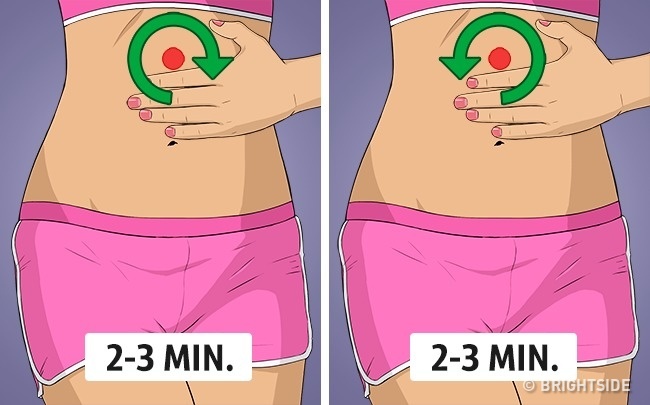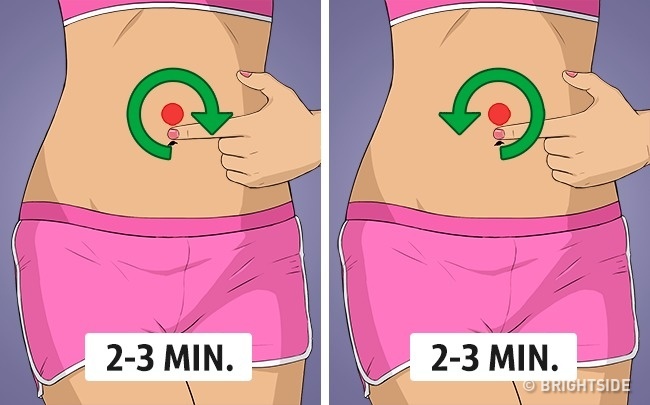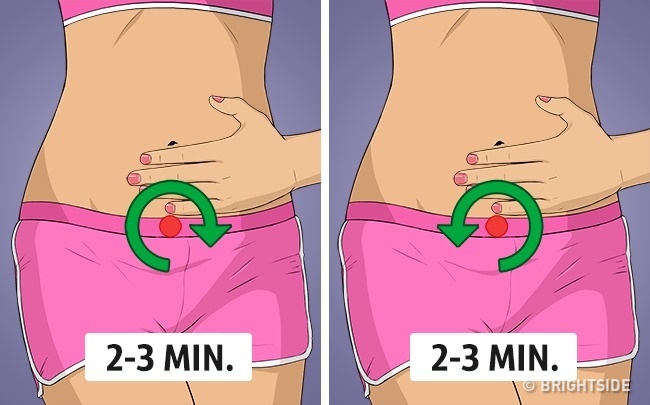12 Ways to Get Rid of a Bloated Belly Without Abs Exercises
A protruding belly is one of the manifestations of bloating, which in itself is a natural process of the body. In a normal state, about 1 liter (about half) of the stomach and intestine is filled with gas.
The air in the stomach is the result of the work of intestinal microflora microorganisms — bacteria which help the digestive process. The harder it is for the stomach to digest food, the more gases are produced.
FunnyModo offers several ways to get rid of a bloated belly and at the same time help the stomach in its daily hard work.
Method #1: Massaging this point helps to reduce gas formation and relieve the stomach.
The Health Benefits of Massage like this cannot be overstated. Take the navel as a “starting point.” Place 4 fingers horizontally above it. The desired point is above the upper finger. Massage it for 2-3 minutes clockwise and the same counterclockwise. If you did everything right, you’ll feel a sour taste in your mouth and salivation will increase.
Method #2: This massage will help to eliminate water retention and relieve stomach pain.
This point is situated at the height of the second finger above the navel. Press on it, and massage for 2-3 minutes clockwise and as much counterclockwise.
Method #3: This type of massage will increase intestinal activity and remove heaviness.
Place 4 fingers horizontally under the navel. The correct point is located under the little finger. It also needs 2-3 minutes of massage clockwise and as much counterclockwise. If done correctly, it’ll help to get rid of bloating.
A healthy person can have lots of causes of bloating. They’re related to nutrition and the work of the stomach. Here are a few basic tips:
- Drink a glass of warm water with lemon every morning.
A glass of water with lemon juice 15-30 minutes before a meal helps to normalize the secretion of gastric acid, relieves the symptoms of heartburn, and prevents belching and gas formation in the intestine. In addition, lemon contains a lot of vitamin C.
- Don’t drink milk and coffee for breakfast.
Milk stimulates the production of gastric acid and increases acidity. Don’t treat it like a drink — it’s food and quite heavy. Choose yogurt or kefir as they contain probiotics which help the stomach bacteria in digestive processes. As for coffee and beer, they affect the stomach almost the same way as milk.
3. Don’t wash food down.
The drinks you take during a meal dilute the gastric acid and the concentration of enzymes responsible for digestion. Therefore, the food is digested longer, and the fermentation process may begin. A consequence of this is increased gas formation and bloating.
4. Don’t drink alcohol on an empty stomach.
Alcohol stimulates the production of gastric acid, which in the absence of food in the stomach slows down its work and begins to corrode the walls. With frequent use, it kills the microflora of the stomach and intestines. If there’s no question about to drink or not to drink, take care that the stomach doesn’t remain empty.
5. Drink ginger tea.
Ginger, spicy in its nature, calms the stomach and reduces gas formation and intestinal activity. It also dilutes the blood and improves its circulation.
6. Don’t eat too much fatty food.
Fatty food, fast food, and fatty sweets are heavy foods, staying in the stomach during digestion. The harder a food is for the stomach to digest, the more gases it produces. If you eat less fat, you can avoid both heaviness and feelings of discomfort.
7. Don’t “eat air.”
When we eat in a hurry, talk while eating, chew badly, drink carbonated drinks, chew bubblegum, or smoke, we swallow excess air. It’s not dangerous, but it leads to bloating and gas formation.
8. Don’t eat too many foods rich in fiber.
These are numerous fruits, vegetables, berries, and legumes. Excess fiber causes gas formation and hampers the intestinal functioning due to coarse fibers. It’s better to not overdo such food.
9. Relax, sleep well, and meditate.
Anxiety and stress lead to the violation of intestinal motility. To cope with them, you need to properly relax. For example, 15-20 minutes of meditation a day soothes the mind, stomach, and heart and normalizes blood circulation.
Preview photo credit Depositphotos
Based on materials from BBC, Asian Beauty Secrets, NCBI








Comments